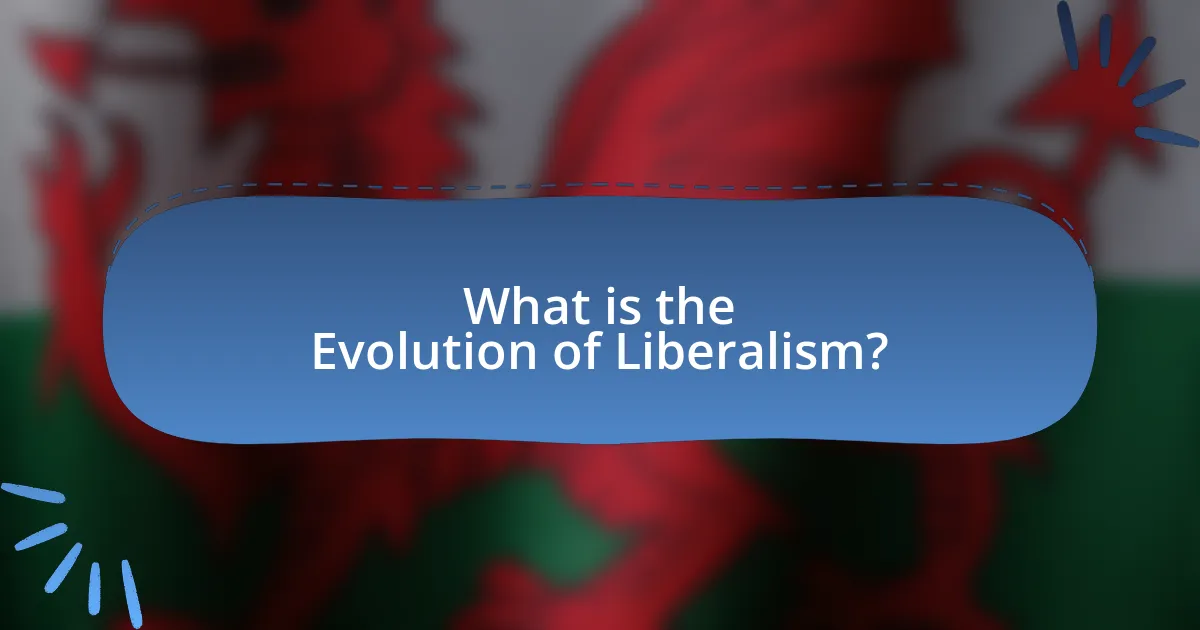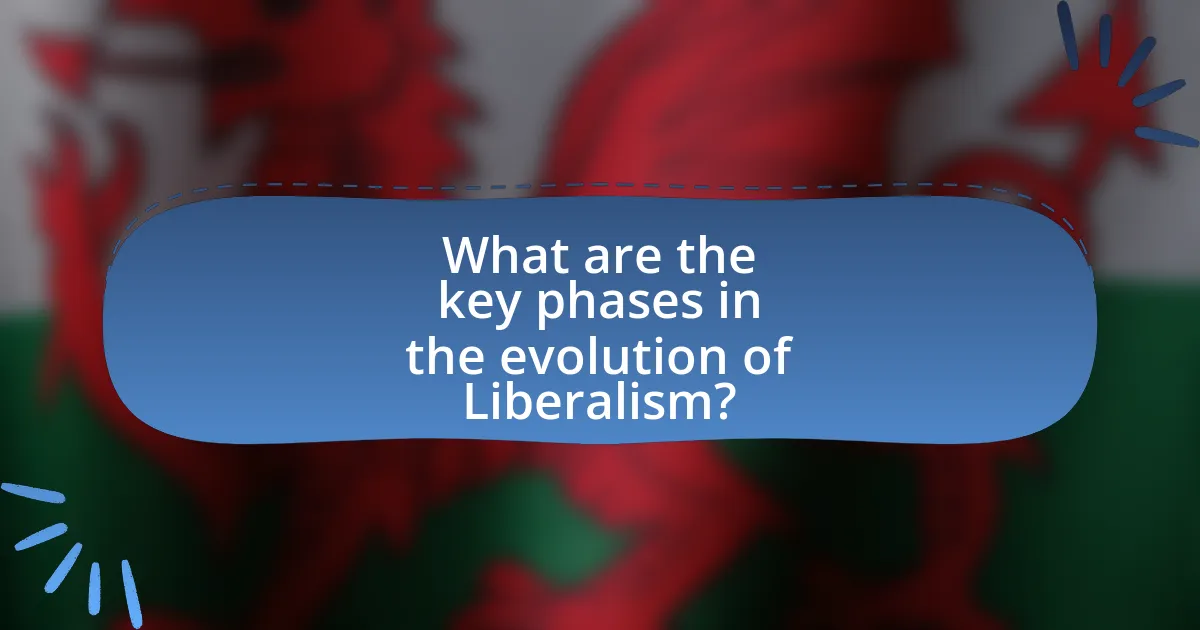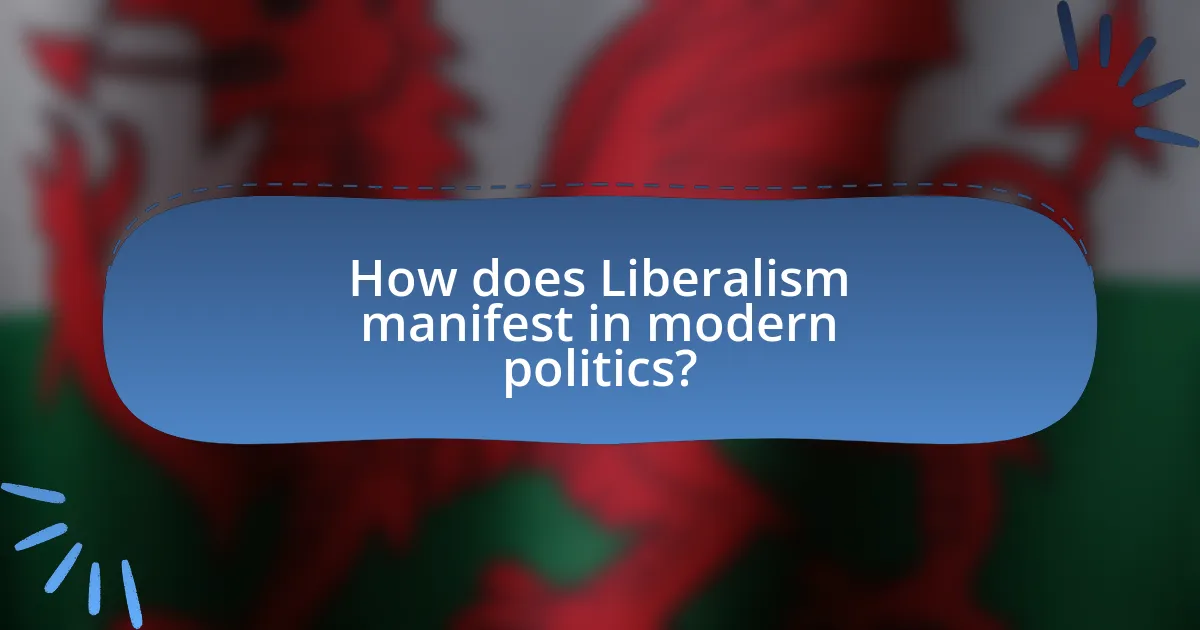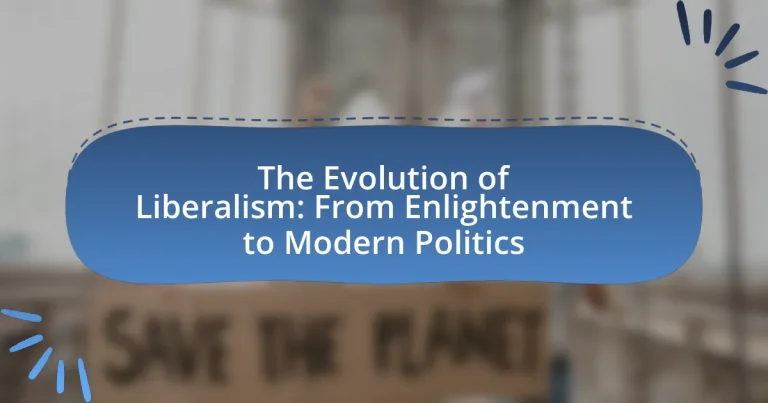The article examines the evolution of liberalism, tracing its historical development from the Enlightenment era to contemporary politics. It highlights key philosophical influences, such as individual rights and democracy, and discusses the contributions of prominent thinkers like John Locke and Montesquieu. The article outlines the progression of liberalism through various phases, including Classical Liberalism, Social Liberalism, and Neo-Liberalism, while addressing the challenges it faces today, such as populism, inequality, and environmental issues. Additionally, it explores how liberalism can adapt to modern concerns and the practical steps individuals can take to support liberal values.

What is the Evolution of Liberalism?
The evolution of liberalism is a historical progression that began in the Enlightenment era, characterized by the emphasis on individual rights, democracy, and free markets. Initially, liberalism emerged as a response to absolute monarchies and feudal systems, advocating for civil liberties and the separation of powers, as seen in the works of philosophers like John Locke and Montesquieu.
In the 19th century, liberalism expanded to include social and economic dimensions, promoting ideas such as social justice and welfare, influenced by thinkers like John Stuart Mill. The 20th century saw the rise of welfare liberalism, which aimed to address inequalities through government intervention, exemplified by policies in Western democracies post-World War II.
Today, liberalism continues to evolve, grappling with globalization, identity politics, and environmental concerns, while maintaining its core principles of individual freedom and equality. This historical trajectory illustrates how liberalism has adapted to changing social, political, and economic contexts, reflecting its dynamic nature.
How did the Enlightenment influence the development of Liberalism?
The Enlightenment significantly influenced the development of Liberalism by promoting ideas of individual rights, reason, and the social contract. Thinkers like John Locke argued that government should be based on the consent of the governed and that individuals possess natural rights to life, liberty, and property. These concepts laid the groundwork for Liberalism, emphasizing personal freedom and equality before the law. The Enlightenment’s focus on rational thought and skepticism of authority encouraged the questioning of traditional power structures, leading to political movements that sought to establish democratic governance and protect civil liberties.
What key philosophical ideas emerged during the Enlightenment?
Key philosophical ideas that emerged during the Enlightenment include reason, individualism, skepticism of authority, and the social contract. Reason was championed by thinkers like René Descartes and Immanuel Kant, who argued that human rationality could lead to knowledge and progress. Individualism emphasized personal freedom and autonomy, as seen in the works of John Locke, who asserted that individuals have natural rights to life, liberty, and property. Skepticism of authority challenged traditional power structures, with philosophers like Voltaire advocating for freedom of speech and religious tolerance. The social contract theory, articulated by Jean-Jacques Rousseau, posited that governments derive their legitimacy from the consent of the governed, fundamentally influencing modern democratic thought. These ideas collectively laid the groundwork for liberalism and shaped contemporary political philosophy.
Who were the prominent thinkers associated with Enlightenment Liberalism?
Prominent thinkers associated with Enlightenment Liberalism include John Locke, Jean-Jacques Rousseau, and Montesquieu. John Locke’s theories on natural rights and government by consent laid the groundwork for liberal democracy. Jean-Jacques Rousseau emphasized the social contract and popular sovereignty, influencing democratic ideals. Montesquieu’s work on the separation of powers provided a framework for modern governance. These thinkers collectively shaped the principles of individual liberty, equality, and justice that are foundational to liberal thought.
What are the core principles of Liberalism?
The core principles of Liberalism include individual liberty, equality, democracy, and the rule of law. Individual liberty emphasizes the importance of personal freedom and autonomy, allowing individuals to pursue their own paths without undue interference. Equality advocates for equal rights and opportunities for all individuals, regardless of their background. Democracy supports the idea of government by the people, ensuring that citizens have a voice in political decision-making. The rule of law establishes that laws apply equally to all individuals, protecting rights and maintaining order. These principles have shaped modern political systems and are foundational to liberal democratic societies.
How does individual freedom shape Liberal thought?
Individual freedom is a foundational principle that shapes Liberal thought by emphasizing the importance of personal autonomy and self-determination. This concept emerged during the Enlightenment, where philosophers like John Locke argued that individuals possess inherent rights to life, liberty, and property. These ideas influenced the development of democratic governance and the protection of civil liberties, asserting that a just society must prioritize individual rights over collective authority. Historical events, such as the American and French Revolutions, further solidified the connection between individual freedom and Liberal ideology, demonstrating that societies thrive when individuals are free to pursue their own interests and express their beliefs without oppression.
What role does equality play in Liberalism?
Equality is a fundamental principle in Liberalism, serving as a cornerstone for individual rights and social justice. In Liberal thought, equality emphasizes that all individuals possess inherent worth and should have equal access to opportunities, rights, and protections under the law. This concept is rooted in Enlightenment ideas, particularly those articulated by philosophers like John Locke and Jean-Jacques Rousseau, who argued that political legitimacy arises from the consent of equal individuals. Historical developments, such as the abolition of slavery and the civil rights movements, further illustrate how equality has been pivotal in shaping Liberal policies and advocating for the rights of marginalized groups. Thus, equality not only underpins the moral framework of Liberalism but also drives its evolution and application in modern political contexts.
How has Liberalism evolved over time?
Liberalism has evolved significantly from its Enlightenment origins in the 17th and 18th centuries to contemporary political thought. Initially, liberalism emphasized individual rights, freedom of expression, and the separation of church and state, as articulated by philosophers like John Locke and Voltaire. Over time, the movement expanded to include social and economic dimensions, advocating for civil rights, gender equality, and welfare state principles, particularly during the 19th and 20th centuries. The rise of social liberalism in the 20th century further transformed liberalism by integrating ideas of social justice and collective responsibility, responding to the challenges posed by industrialization and globalization. This evolution reflects a shift from a focus solely on individual liberties to a broader understanding of equality and community welfare, demonstrating liberalism’s adaptability to changing societal needs and values.
What historical events have significantly impacted Liberalism?
The Enlightenment, the American Revolution, and the French Revolution are historical events that have significantly impacted Liberalism. The Enlightenment, occurring in the 17th and 18th centuries, introduced ideas of individual rights, reason, and democracy, laying the philosophical groundwork for Liberal thought. The American Revolution (1775-1783) established a government based on liberal principles, emphasizing liberty and equality, which inspired other nations. The French Revolution (1789) further advanced Liberalism by promoting the concepts of citizenship and secular governance, challenging monarchies and advocating for civil liberties. These events collectively shaped the trajectory of Liberalism, influencing political systems and ideologies worldwide.
How have different regions adapted Liberal principles?
Different regions have adapted Liberal principles in various ways, reflecting their unique historical, cultural, and political contexts. For instance, Western Europe has embraced Liberalism through the establishment of democratic institutions, protection of individual rights, and promotion of free markets, as seen in countries like Sweden and Germany, where social democracy integrates Liberal values with social welfare. In contrast, the United States has adapted Liberal principles by emphasizing individualism and limited government, evident in its Constitution and Bill of Rights, which prioritize personal freedoms and economic liberties. Meanwhile, in Latin America, countries like Chile have incorporated Liberal principles through market-oriented reforms and democratic governance, although often facing challenges related to inequality and political instability. These adaptations demonstrate that while the core tenets of Liberalism—such as individual rights and democracy—remain consistent, their implementation varies significantly across different regions.

What are the key phases in the evolution of Liberalism?
The key phases in the evolution of Liberalism include the Enlightenment phase, the Classical Liberalism phase, the Social Liberalism phase, and the Neoliberalism phase. The Enlightenment phase, occurring in the 17th and 18th centuries, emphasized reason, individualism, and the social contract, with thinkers like John Locke advocating for natural rights and government by consent. The Classical Liberalism phase, prominent in the 19th century, focused on free markets, limited government, and civil liberties, influenced by economists like Adam Smith and political theorists such as John Stuart Mill. The Social Liberalism phase emerged in the late 19th and early 20th centuries, advocating for social justice and welfare, with figures like Franklin D. Roosevelt promoting the New Deal. Finally, the Neoliberalism phase, which gained traction in the late 20th century, emphasized deregulation, privatization, and free-market capitalism, with leaders like Margaret Thatcher and Ronald Reagan implementing these policies. Each phase reflects a response to the socio-economic and political challenges of its time, shaping the trajectory of Liberal thought and practice.
What characterized Classical Liberalism?
Classical Liberalism is characterized by its emphasis on individual liberty, limited government, and free markets. This ideology emerged during the Enlightenment, advocating for personal freedoms and the protection of private property as fundamental rights. Key figures such as John Locke and Adam Smith argued that government should exist primarily to protect these rights, and that economic freedom leads to prosperity and innovation. Historical contexts, such as the American and French Revolutions, further solidified these principles, demonstrating the practical application of Classical Liberalism in promoting democratic governance and economic growth.
How did Classical Liberalism respond to the Industrial Revolution?
Classical Liberalism responded to the Industrial Revolution by advocating for individual freedoms, free markets, and limited government intervention. This ideology emerged as a reaction to the economic changes brought about by industrialization, emphasizing the importance of personal liberty and economic competition. Classical liberals, such as Adam Smith, argued that the invisible hand of the market would lead to prosperity and innovation, as seen in Smith’s seminal work “The Wealth of Nations” published in 1776. They believed that government should primarily protect property rights and maintain order, allowing individuals to pursue their economic interests without excessive regulation. This perspective contributed to the development of capitalist economies and influenced policies that promoted entrepreneurship and industrial growth during the 19th century.
What were the main critiques of Classical Liberalism?
The main critiques of Classical Liberalism include its perceived neglect of social inequalities, its overemphasis on individualism, and its inadequate response to collective needs. Critics argue that Classical Liberalism prioritizes personal freedom and market mechanisms, often leading to economic disparities and social injustice. For instance, Karl Marx criticized Classical Liberalism for fostering capitalism, which he believed resulted in the exploitation of the working class. Additionally, contemporary critiques highlight that Classical Liberalism fails to address systemic issues such as poverty and discrimination, as it assumes that free markets will naturally lead to equitable outcomes. This critique is supported by various studies indicating that unregulated markets can exacerbate wealth gaps, undermining the foundational goal of promoting individual liberty for all.
What is the significance of Social Liberalism?
Social Liberalism is significant because it advocates for individual freedoms while emphasizing social justice and equality. This ideology emerged in response to the limitations of classical liberalism, which prioritized economic freedom over social welfare. Social Liberalism seeks to balance personal liberties with the need for government intervention to address social inequalities, as seen in policies promoting healthcare, education, and workers’ rights. Historical examples include the establishment of welfare states in the mid-20th century, which aimed to reduce poverty and provide a safety net for citizens, demonstrating the practical application of Social Liberalism in shaping modern democratic societies.
How did Social Liberalism address issues of social justice?
Social Liberalism addressed issues of social justice by advocating for government intervention to promote equality and protect individual rights. This approach emerged in response to the inequalities exacerbated by industrialization and capitalism, emphasizing the need for social welfare programs, labor rights, and civil rights protections. For instance, the establishment of the welfare state in the mid-20th century, particularly in countries like the United Kingdom, aimed to reduce poverty and provide access to healthcare and education, thereby enhancing social equity. Additionally, Social Liberalism has historically supported movements for racial and gender equality, exemplified by the civil rights movement in the United States, which sought to dismantle systemic discrimination and promote equal opportunities for marginalized groups.
What are the differences between Social Liberalism and Classical Liberalism?
Social Liberalism emphasizes social justice and the role of the state in ensuring equality and welfare, while Classical Liberalism prioritizes individual freedom, limited government, and free markets. Social Liberals advocate for policies like universal healthcare and education, believing that the state should intervene to address social inequalities. In contrast, Classical Liberals argue that minimal government intervention allows for personal responsibility and economic growth, as seen in the writings of John Stuart Mill and Adam Smith. The historical context of these ideologies shows that Social Liberalism emerged in response to the inadequacies of Classical Liberalism in addressing social issues during the Industrial Revolution.
What role does Neo-Liberalism play in contemporary politics?
Neo-liberalism plays a significant role in contemporary politics by promoting free-market principles, deregulation, and reduced government intervention in the economy. This economic ideology has influenced policies worldwide since the late 20th century, advocating for privatization of state-owned enterprises and emphasizing individual entrepreneurship. For instance, the implementation of neo-liberal policies in countries like the United Kingdom under Margaret Thatcher and the United States under Ronald Reagan led to substantial shifts in economic practices, resulting in increased global trade and investment. Additionally, neo-liberalism has been linked to rising income inequality, as wealth concentration has intensified in many nations, highlighting the socio-economic impacts of these policies.
How has Neo-Liberalism influenced global economic policies?
Neo-liberalism has significantly influenced global economic policies by promoting free-market principles, deregulation, and privatization. This approach has led to the reduction of state intervention in economies, encouraging competition and efficiency. For instance, the implementation of neo-liberal policies in the 1980s, particularly in the United Kingdom under Prime Minister Margaret Thatcher and in the United States under President Ronald Reagan, resulted in widespread deregulation of industries and a shift towards privatizing state-owned enterprises. According to the World Bank, countries adopting neo-liberal reforms experienced increased foreign direct investment and economic growth, although often accompanied by rising inequality and social unrest.
What criticisms have been leveled against Neo-Liberalism?
Criticisms leveled against Neo-Liberalism include its tendency to exacerbate income inequality, undermine public services, and prioritize market efficiency over social welfare. Critics argue that Neo-Liberal policies, such as deregulation and privatization, often lead to a concentration of wealth among the elite while marginalizing lower-income populations. For instance, a report by the International Monetary Fund in 2015 indicated that income inequality has increased in many countries implementing Neo-Liberal reforms, suggesting a correlation between these policies and widening economic disparities. Additionally, opponents contend that the focus on free markets can erode essential public services, as seen in the healthcare and education sectors, where privatization has sometimes resulted in reduced access for disadvantaged groups.

How does Liberalism manifest in modern politics?
Liberalism manifests in modern politics through the promotion of individual rights, democratic governance, and free-market economies. These principles are evident in various political systems that prioritize civil liberties, such as freedom of speech, religion, and assembly, which are enshrined in constitutions and legal frameworks across many democratic nations. For instance, the Universal Declaration of Human Rights, adopted by the United Nations in 1948, reflects liberal values by affirming the rights of individuals globally. Additionally, liberalism influences economic policies that advocate for minimal government intervention in markets, as seen in countries like the United States and the United Kingdom, where neoliberal policies have shaped economic practices since the late 20th century. The presence of liberal political parties, such as the Liberal Democrats in the UK and the Democratic Party in the US, further illustrates the ongoing impact of liberalism in shaping policy agendas focused on social justice, equality, and personal freedoms.
What are the current challenges facing Liberalism today?
Current challenges facing Liberalism today include the rise of populism, increasing inequality, and the erosion of democratic norms. Populism has gained traction in various countries, often positioning itself against liberal values and institutions, as seen in the election of leaders who prioritize nationalism over global cooperation. Economic inequality has also intensified, undermining the liberal principle of equal opportunity, with wealth concentration in the hands of a few exacerbating social tensions. Furthermore, democratic norms are being challenged by authoritarian tendencies, where governments increasingly restrict freedoms of speech and assembly, as evidenced by recent crackdowns in several nations. These factors collectively threaten the foundational tenets of Liberalism, making its future uncertain.
How do populism and nationalism affect Liberal values?
Populism and nationalism significantly challenge liberal values by prioritizing collective identity and majoritarianism over individual rights and pluralism. Populist movements often emphasize a direct connection between leaders and the “common people,” undermining the liberal principle of representative democracy, which relies on checks and balances. Nationalism can lead to exclusionary policies that prioritize the interests of a specific group, often at the expense of minority rights, contradicting the liberal commitment to equality and diversity. Historical examples include the rise of nationalist parties in Europe, which have sought to limit immigration and promote cultural homogeneity, thereby eroding the liberal framework that supports multiculturalism and individual freedoms.
What impact does technology have on modern Liberalism?
Technology significantly influences modern Liberalism by enhancing communication, promoting individual rights, and facilitating democratic participation. The rise of the internet and social media has democratized information access, allowing diverse voices to contribute to political discourse, which aligns with Liberalism’s emphasis on individual freedom and equality. For instance, platforms like Twitter and Facebook have enabled grassroots movements, such as the Arab Spring, showcasing how technology can mobilize citizens for democratic change. Additionally, technology fosters transparency in governance through tools like open data initiatives, which empower citizens to hold governments accountable, reinforcing the Liberal principle of accountability.
How can Liberalism adapt to contemporary issues?
Liberalism can adapt to contemporary issues by embracing a more inclusive approach that addresses social inequalities and environmental challenges. This adaptation involves integrating progressive policies that promote social justice, such as universal healthcare and equitable education, which align with the core liberal values of individual rights and freedoms. For instance, the rise of movements advocating for racial and gender equality reflects a shift within liberalism to address systemic injustices, demonstrating its capacity for evolution. Additionally, the increasing urgency of climate change has prompted liberalism to incorporate environmental sustainability into its framework, advocating for policies that balance economic growth with ecological responsibility. This responsiveness to pressing global issues illustrates how liberalism can remain relevant and effective in addressing the complexities of modern society.
What strategies can Liberals employ to remain relevant?
Liberals can remain relevant by actively engaging with contemporary social issues and adapting their policies to reflect the evolving values of society. This includes prioritizing climate change, social justice, and economic inequality, which resonate with younger voters. For instance, a 2020 Pew Research Center study indicated that 70% of millennials view climate change as a major threat, highlighting the necessity for Liberals to incorporate environmental policies into their platforms. Additionally, fostering grassroots movements and utilizing digital platforms for outreach can enhance their connection with constituents, as seen in successful campaigns that leverage social media to mobilize support. By aligning their strategies with the pressing concerns of the electorate, Liberals can maintain their relevance in modern politics.
How can Liberalism address climate change and social inequality?
Liberalism can address climate change and social inequality by promoting policies that prioritize environmental sustainability and equitable resource distribution. This approach includes advocating for renewable energy investments, implementing carbon pricing, and supporting social safety nets that ensure marginalized communities are not disproportionately affected by climate policies. For instance, the European Union’s Green Deal aims to achieve climate neutrality while ensuring a just transition for workers in fossil fuel industries, demonstrating how liberal policies can integrate environmental and social goals. Additionally, research from the Intergovernmental Panel on Climate Change highlights that inclusive climate action can enhance resilience and reduce vulnerabilities among disadvantaged populations, reinforcing the connection between liberalism, climate action, and social equity.
What practical steps can individuals take to support Liberal values?
Individuals can support Liberal values by actively participating in democratic processes, such as voting in elections and advocating for policies that promote individual rights and freedoms. Engaging in community discussions and supporting organizations that align with Liberal principles, like civil liberties groups, further reinforces these values. For instance, research shows that voter turnout significantly impacts policy outcomes, with higher participation rates leading to more representative governance. Additionally, studies indicate that grassroots movements can effectively influence legislation, demonstrating the power of collective action in promoting Liberal ideals.


